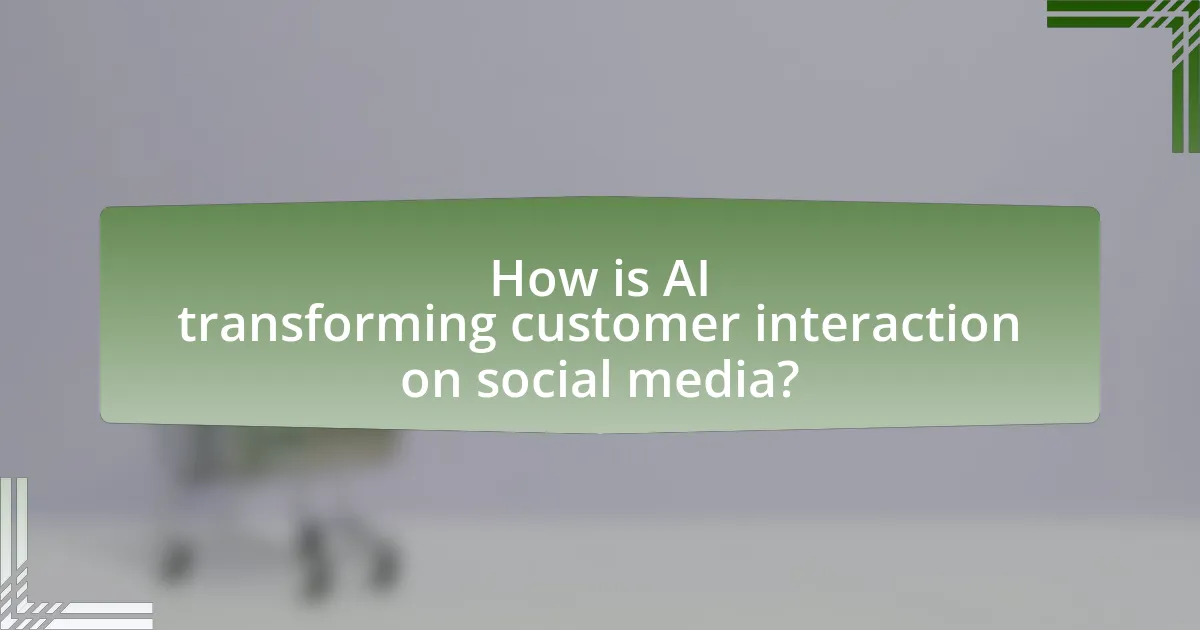The article focuses on the role of artificial intelligence (AI) in social media management, highlighting its significance in automating tasks, analyzing data, and enhancing user engagement. Key topics include how AI improves social media strategies through data-driven decision-making and personalized content delivery, the specific AI technologies utilized, and the benefits of AI in content creation, customer interaction, and performance tracking. Additionally, the article addresses challenges such as data privacy concerns and algorithmic bias, while emphasizing best practices for integrating AI into social media management effectively.

What is the Role of AI in Social Media Management?
AI plays a crucial role in social media management by automating tasks, analyzing data, and enhancing user engagement. It enables businesses to schedule posts, respond to customer inquiries, and monitor brand sentiment in real-time. For instance, AI tools can analyze vast amounts of social media data to identify trends and audience preferences, allowing companies to tailor their content effectively. According to a report by Hootsuite, 70% of marketers believe that AI will significantly impact their social media strategies, highlighting its importance in optimizing performance and driving engagement.
How does AI enhance social media strategies?
AI enhances social media strategies by enabling data-driven decision-making and personalized content delivery. Through advanced algorithms, AI analyzes user behavior, engagement patterns, and demographic data, allowing brands to tailor their messaging effectively. For instance, a study by Sprout Social found that 70% of consumers prefer personalized ads, demonstrating the effectiveness of AI in creating targeted campaigns. Additionally, AI tools can automate content scheduling and optimize posting times based on when audiences are most active, further increasing engagement rates. This strategic use of AI not only improves user experience but also drives higher conversion rates for businesses.
What specific AI technologies are used in social media management?
Specific AI technologies used in social media management include natural language processing (NLP), machine learning algorithms, chatbots, and image recognition systems. Natural language processing enables the analysis of user-generated content, allowing brands to understand sentiment and engagement levels. Machine learning algorithms help in predicting trends and optimizing content strategies based on user behavior. Chatbots facilitate real-time customer interaction, enhancing user experience and engagement. Image recognition systems assist in identifying brand logos and user-generated content, streamlining content curation and monitoring. These technologies collectively enhance efficiency and effectiveness in managing social media platforms.
How do these technologies improve user engagement?
AI technologies improve user engagement by personalizing content and enhancing interaction. By analyzing user data, AI can tailor recommendations and posts to individual preferences, leading to increased relevance and interest. For instance, platforms like Facebook and Instagram utilize algorithms that prioritize content based on user behavior, resulting in higher interaction rates. According to a study by McKinsey, personalized experiences can lead to a 10-30% increase in engagement metrics. Additionally, AI-driven chatbots facilitate real-time communication, allowing brands to respond promptly to user inquiries, which further boosts engagement levels.
What are the key benefits of using AI in social media management?
The key benefits of using AI in social media management include enhanced efficiency, improved audience targeting, and data-driven insights. AI automates repetitive tasks such as scheduling posts and responding to customer inquiries, which saves time for social media managers. Additionally, AI algorithms analyze user behavior and preferences, allowing for more precise targeting of content to specific demographics, thereby increasing engagement rates. According to a report by Hootsuite, businesses that utilize AI in their social media strategies can see up to a 30% increase in engagement due to personalized content delivery. Furthermore, AI tools provide analytics that help in understanding campaign performance, enabling data-driven decision-making that optimizes future strategies.
How does AI contribute to content creation and curation?
AI significantly enhances content creation and curation by automating processes, generating insights, and personalizing user experiences. For instance, AI algorithms can analyze vast amounts of data to identify trending topics, enabling creators to produce relevant content that resonates with audiences. Additionally, AI tools like natural language processing can generate written content, such as articles or social media posts, efficiently and at scale. Research from McKinsey indicates that companies using AI for content generation can increase productivity by up to 40%. Furthermore, AI-driven recommendation systems curate content tailored to individual preferences, improving engagement and retention rates on social media platforms.
What impact does AI have on analytics and performance tracking?
AI significantly enhances analytics and performance tracking by automating data collection and analysis, leading to more accurate insights. For instance, AI algorithms can process vast amounts of social media data in real-time, identifying trends and user behaviors that human analysts might miss. According to a report by McKinsey, companies that leverage AI for analytics can improve their decision-making speed by up to 5 times, demonstrating the efficiency AI brings to performance tracking. Furthermore, AI-driven tools can provide predictive analytics, allowing businesses to anticipate future trends based on historical data, thus optimizing their social media strategies effectively.

How is AI transforming customer interaction on social media?
AI is transforming customer interaction on social media by enabling real-time, personalized communication through chatbots and automated responses. These AI-driven tools can analyze customer inquiries and provide instant, relevant answers, significantly improving response times and customer satisfaction. For instance, according to a report by Gartner, by 2025, 75% of customer service interactions will be powered by AI, demonstrating the growing reliance on these technologies for efficient customer engagement. Additionally, AI algorithms can analyze user behavior and preferences, allowing brands to tailor their messaging and offers, further enhancing the customer experience.
What role does AI play in customer service through social media?
AI plays a crucial role in customer service through social media by automating responses and enhancing user engagement. It enables businesses to provide instant support via chatbots, which can handle common inquiries and issues 24/7, significantly reducing response times. According to a report by Gartner, by 2022, 70% of customer interactions were expected to involve emerging technologies like AI, demonstrating its growing importance in streamlining customer service processes. Additionally, AI analyzes customer data to personalize interactions, improving customer satisfaction and loyalty.
How do chatbots improve response times and customer satisfaction?
Chatbots improve response times and customer satisfaction by providing instant, 24/7 assistance to users. This immediate availability allows customers to receive answers to their inquiries without waiting for human agents, significantly reducing response times. For instance, a study by Juniper Research found that chatbots can handle up to 80% of routine customer service inquiries, leading to faster resolutions. Additionally, chatbots can personalize interactions based on user data, enhancing the overall customer experience. According to a report by PwC, 79% of consumers prefer chatbots for quick communication with brands, indicating that effective chatbot implementation directly correlates with increased customer satisfaction.
What are the limitations of AI in handling customer inquiries?
AI has limitations in handling customer inquiries primarily due to its inability to understand complex human emotions and context. This limitation can lead to misinterpretations of customer intent, resulting in inadequate or irrelevant responses. For instance, AI systems often struggle with nuanced language, sarcasm, or cultural references, which can hinder effective communication. Additionally, AI lacks the ability to provide personalized responses based on individual customer histories or preferences, which can diminish customer satisfaction. Research indicates that 70% of consumers prefer human interaction for complex issues, highlighting the inadequacy of AI in fully addressing customer needs.
How does AI personalize user experiences on social media platforms?
AI personalizes user experiences on social media platforms by analyzing user data to tailor content, advertisements, and interactions. This process involves algorithms that assess user behavior, preferences, and engagement patterns, allowing platforms to deliver relevant posts and suggestions. For instance, Facebook uses machine learning to curate news feeds based on individual interactions, ensuring users see content that aligns with their interests. Research indicates that personalized recommendations can increase user engagement by up to 50%, demonstrating the effectiveness of AI in enhancing user satisfaction and retention on these platforms.
What algorithms are used for content personalization?
Algorithms used for content personalization include collaborative filtering, content-based filtering, and hybrid methods. Collaborative filtering analyzes user behavior and preferences to recommend content based on similar users’ interactions, while content-based filtering focuses on the attributes of the content itself to suggest items similar to those a user has liked in the past. Hybrid methods combine both approaches to enhance recommendation accuracy. These algorithms are widely implemented in platforms like Netflix and Spotify, which utilize them to tailor user experiences based on extensive data analysis and user engagement metrics.
How does personalization affect user retention and loyalty?
Personalization significantly enhances user retention and loyalty by creating tailored experiences that meet individual preferences. When users receive content, recommendations, or interactions that resonate with their specific interests, they are more likely to engage consistently with the platform. For instance, a study by McKinsey & Company found that personalized experiences can lead to a 10-30% increase in user engagement, which directly correlates with higher retention rates. Furthermore, platforms that utilize AI-driven personalization strategies, such as targeted advertisements and customized content feeds, have reported improved customer loyalty, as users feel valued and understood. This connection fosters a sense of community and belonging, further solidifying their commitment to the platform.

What challenges does AI face in social media management?
AI faces several challenges in social media management, including data privacy concerns, algorithmic bias, and the difficulty of understanding context. Data privacy issues arise as AI systems require access to large amounts of user data to function effectively, which can lead to violations of user trust and regulatory compliance, as seen in cases like the Cambridge Analytica scandal. Algorithmic bias occurs when AI systems inadvertently reflect societal biases present in training data, resulting in unfair treatment of certain user groups. Additionally, understanding context is challenging for AI, as social media interactions often involve nuanced language, sarcasm, and cultural references that AI may misinterpret, leading to ineffective or inappropriate responses.
What ethical considerations arise from using AI in social media?
The ethical considerations arising from using AI in social media include privacy concerns, misinformation, and algorithmic bias. Privacy concerns stem from AI’s ability to analyze vast amounts of personal data, potentially infringing on user confidentiality and consent. Misinformation is exacerbated by AI-generated content, which can spread false narratives rapidly, impacting public opinion and trust. Algorithmic bias occurs when AI systems reflect or amplify societal biases, leading to discrimination in content moderation and user engagement. These issues highlight the need for ethical frameworks and regulations to ensure responsible AI use in social media.
How can bias in AI algorithms impact social media interactions?
Bias in AI algorithms can significantly distort social media interactions by perpetuating stereotypes and amplifying misinformation. When algorithms are trained on biased data, they may favor certain viewpoints or demographics, leading to unequal representation and engagement. For instance, a study by the AI Now Institute found that biased algorithms can result in the marginalization of minority voices, as content from these groups may be deprioritized in feeds. This can create echo chambers, where users are exposed primarily to similar opinions, further entrenching biases and limiting diverse discourse. Additionally, biased algorithms can influence the spread of harmful content, as they may prioritize sensational or misleading posts over factual information, impacting public perception and behavior.
What measures can be taken to ensure ethical AI usage?
To ensure ethical AI usage, organizations should implement transparency, accountability, and fairness in AI systems. Transparency involves clearly communicating how AI algorithms function and the data they utilize, allowing users to understand decision-making processes. Accountability requires establishing clear guidelines and responsibilities for AI outcomes, ensuring that developers and organizations are answerable for their systems’ impacts. Fairness entails actively working to eliminate biases in AI training data and algorithms, promoting equitable treatment across diverse user groups. Research indicates that organizations adopting these measures can significantly reduce ethical risks associated with AI, as highlighted in the “Ethics of Artificial Intelligence and Robotics” report by the European Commission.
How does data privacy affect the implementation of AI in social media?
Data privacy significantly impacts the implementation of AI in social media by necessitating stricter data handling practices and compliance with regulations. Social media platforms must ensure that AI systems do not violate user privacy rights, which can limit the types of data that can be collected and analyzed. For instance, the General Data Protection Regulation (GDPR) in Europe mandates explicit consent from users for data processing, affecting how AI algorithms are trained and deployed. Consequently, social media companies may face challenges in leveraging user data for personalized content and targeted advertising, as they must balance innovation with legal obligations to protect user privacy.
What regulations must be considered when using AI for data analysis?
When using AI for data analysis, regulations such as the General Data Protection Regulation (GDPR) and the California Consumer Privacy Act (CCPA) must be considered. GDPR mandates strict guidelines on data privacy and protection for individuals within the European Union, requiring organizations to obtain explicit consent for data processing and to ensure data security. CCPA provides similar protections for California residents, granting them rights regarding their personal information, including the right to know what data is collected and the right to opt-out of its sale. Compliance with these regulations is essential to avoid legal penalties and to maintain consumer trust in AI-driven data analysis practices.
How can companies balance AI utilization with user privacy concerns?
Companies can balance AI utilization with user privacy concerns by implementing robust data protection measures and transparent data usage policies. By adopting privacy-by-design principles, organizations can ensure that AI systems are developed with user privacy as a core consideration, minimizing data collection to only what is necessary for functionality. Additionally, companies can utilize anonymization techniques to protect user identities while still leveraging AI for insights. Research from the International Association of Privacy Professionals indicates that 79% of consumers are more likely to engage with companies that prioritize data privacy, highlighting the importance of trust in maintaining user relationships.
What are best practices for integrating AI into social media management?
Best practices for integrating AI into social media management include leveraging AI for content creation, utilizing chatbots for customer engagement, and employing analytics tools for performance measurement. AI-driven content creation tools can generate posts tailored to audience preferences, enhancing engagement rates. Chatbots can provide instant responses to customer inquiries, improving user experience and satisfaction. Additionally, analytics tools powered by AI can analyze user interactions and campaign performance, allowing for data-driven decision-making and strategy optimization. According to a report by Hootsuite, businesses using AI in social media management see a 30% increase in engagement and a 25% reduction in response time, validating the effectiveness of these practices.
How can businesses effectively train their teams on AI tools?
Businesses can effectively train their teams on AI tools by implementing structured training programs that include hands-on workshops, online courses, and continuous learning opportunities. These programs should focus on practical applications of AI tools relevant to social media management, such as content creation, analytics, and customer engagement. Research indicates that organizations that provide comprehensive training see a 20% increase in productivity and a 30% improvement in employee satisfaction (Source: LinkedIn Learning, 2021). By utilizing real-world scenarios and case studies, businesses can enhance understanding and retention of AI tool functionalities, ensuring teams are well-equipped to leverage these technologies in their social media strategies.
What strategies can enhance the effectiveness of AI in social media campaigns?
Implementing data-driven targeting and personalization strategies can significantly enhance the effectiveness of AI in social media campaigns. By analyzing user behavior and preferences, AI can tailor content to specific audience segments, increasing engagement rates. For instance, a study by McKinsey found that personalized marketing can lead to a 10-30% increase in conversion rates. Additionally, leveraging AI for sentiment analysis allows brands to gauge audience reactions in real-time, enabling timely adjustments to campaigns. According to a report by Gartner, organizations that utilize AI for customer engagement see a 20% improvement in customer satisfaction. These strategies collectively optimize resource allocation and improve overall campaign performance.




